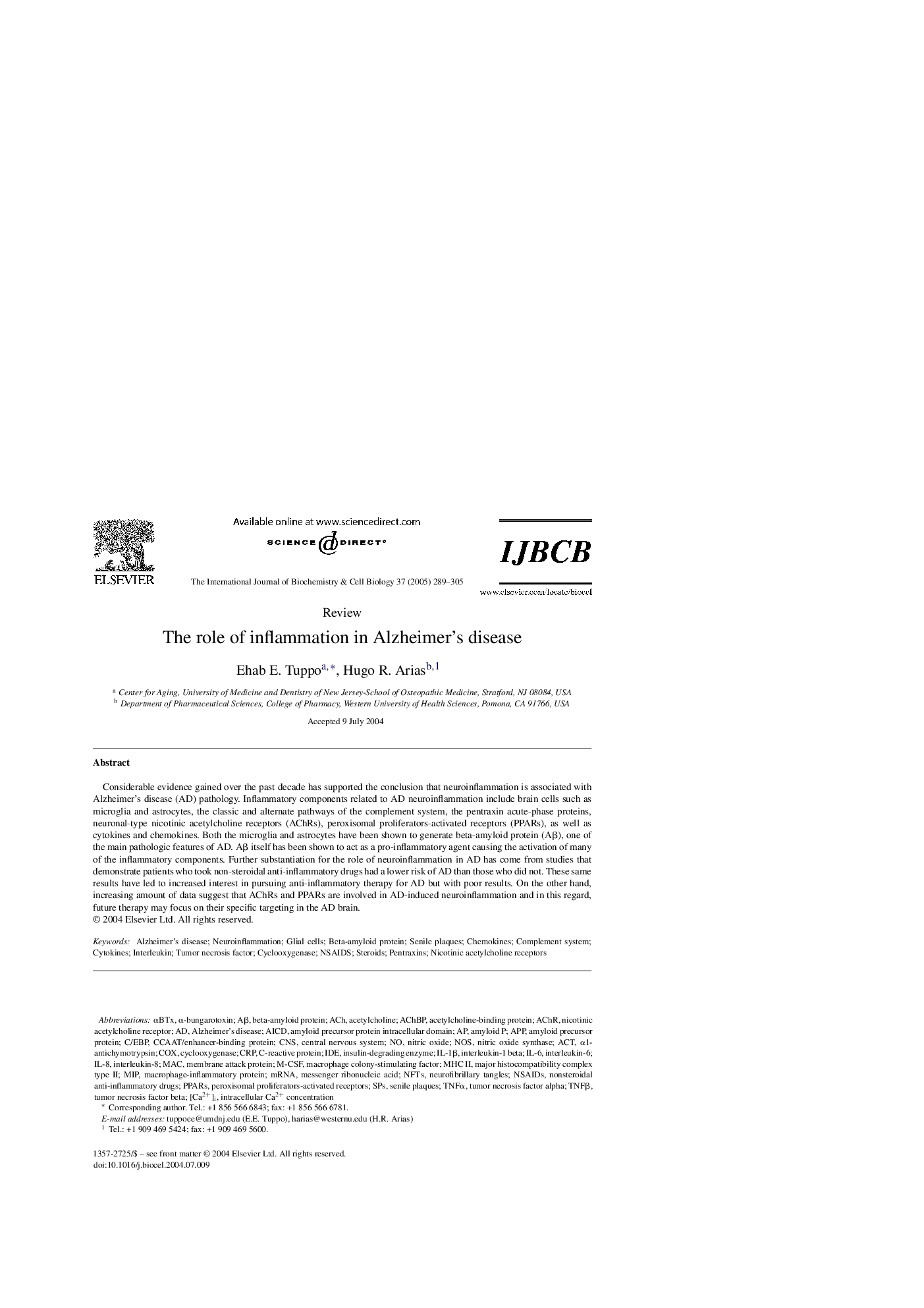| کد مقاله | کد نشریه | سال انتشار | مقاله انگلیسی | نسخه تمام متن |
|---|---|---|---|---|
| 9890099 | 1540001 | 2005 | 17 صفحه PDF | دانلود رایگان |
عنوان انگلیسی مقاله ISI
The role of inflammation in Alzheimer's disease
دانلود مقاله + سفارش ترجمه
دانلود مقاله ISI انگلیسی
رایگان برای ایرانیان
کلمات کلیدی
IL-1βamyloid Pα1-antichymotrypsinAChBPMHC IIM-CSFIL-8NFTsα-bungarotoxinAICDAChRNSAIDSAPPNOSACTIL-6COXMIPmRNAAβC/EBP - C / EBPPPARs - PPAR هاinsulin-degrading enzyme - آنزیم تحقیر کننده انسولینcyclooxygenase - آنزیم سیکلواکسیژنازACh - آهAcetylcholine - استیل کولینInterleukin-8 - اینترلوکین -8interleukin-6 - اینترلوکین ۶Interleukin-1 beta - اینترلوکین-1 بتاIDE - اینجاAlzheimer's disease - بیماری آلزایمرNonsteroidal anti-inflammatory drugs - داروهای ضد التهابی غیر استروئیدیAmyloid precursor protein intracellular domain - دامنه داخل سلولی پروتئین پیش ماده آمیلوئیدCNS - دستگاه عصبی مرکزیmessenger ribonucleic acid - رسوب ریبونوکلئیک اسیدcentral nervous system - سیستم عصبی مرکزیmacrophage colony-stimulating factor - ماکروفاژ عامل کلونی تحریک کنندهMAC - مکneurofibrillary tangles - مگس های نوروفیبریلیالNitric oxide - نیتریک اکسیدnitric oxide synthase - نیتریک اکسید سنتازCCAAT/enhancer-binding protein - پروتئین CCAAT / تقویت کنندهAcetylcholine-binding protein - پروتئین اتصال دهنده استیل کولینmacrophage-inflammatory protein - پروتئین التهابی ماکروفاژbeta-amyloid protein - پروتئین بتا آمیلوئیدC-reactive protein - پروتئین واکنشی سیCRP - پروتئین واکنشی سی یا سی. آر. پی amyloid precursor protein - پروتئین پیش ماده آمیلوئیnicotinic acetylcholine receptor - گیرنده استیلکولین نیکوتین
موضوعات مرتبط
علوم زیستی و بیوفناوری
بیوشیمی، ژنتیک و زیست شناسی مولکولی
زیست شیمی
پیش نمایش صفحه اول مقاله

چکیده انگلیسی
Considerable evidence gained over the past decade has supported the conclusion that neuroinflammation is associated with Alzheimer's disease (AD) pathology. Inflammatory components related to AD neuroinflammation include brain cells such as microglia and astrocytes, the classic and alternate pathways of the complement system, the pentraxin acute-phase proteins, neuronal-type nicotinic acetylcholine receptors (AChRs), peroxisomal proliferators-activated receptors (PPARs), as well as cytokines and chemokines. Both the microglia and astrocytes have been shown to generate beta-amyloid protein (Aβ), one of the main pathologic features of AD. Aβ itself has been shown to act as a pro-inflammatory agent causing the activation of many of the inflammatory components. Further substantiation for the role of neuroinflammation in AD has come from studies that demonstrate patients who took non-steroidal anti-inflammatory drugs had a lower risk of AD than those who did not. These same results have led to increased interest in pursuing anti-inflammatory therapy for AD but with poor results. On the other hand, increasing amount of data suggest that AChRs and PPARs are involved in AD-induced neuroinflammation and in this regard, future therapy may focus on their specific targeting in the AD brain.
ناشر
Database: Elsevier - ScienceDirect (ساینس دایرکت)
Journal: The International Journal of Biochemistry & Cell Biology - Volume 37, Issue 2, February 2005, Pages 289-305
Journal: The International Journal of Biochemistry & Cell Biology - Volume 37, Issue 2, February 2005, Pages 289-305
نویسندگان
Ehab E. Tuppo, Hugo R. Arias,